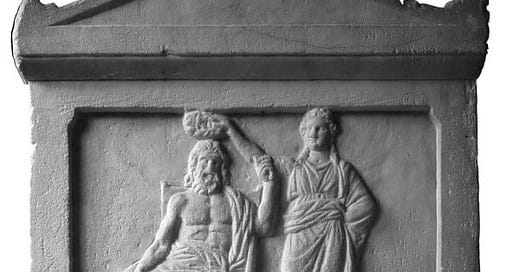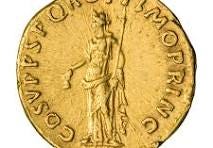Can America learn from Ancient Athens?
Could thinking about the world's first democracy help the most endangered one?
What’s the point of learning about the past? Isn’t it just ‘one damn thing after another'?1 We have no time machines. We’re living and breathing right now, not then. What’s happened has been and gone. It’s yesterday’s news. Gathering dust on a bookshelf which no-one cares about. Isn’t it?
It might not come as much of a surprise that I don’t share this view. I’ve always looked at the past as a vehicle for understanding what is going on now, what might happen next and how we should live in the present.
You often see people fall into two camps when it comes to history though: they either love it, or they’re bored by it. They’re either mesmerised by events and personalities which, though no longer physically present, continue to draw us in like a sea of magnets, or they’re repulsed. They see them as irrelevant. An enemy towards progress even.
But what about when something so seismic happens in the world that those two camps start to become one? When the world stops spinning on its usual axis and starts moving in altogether unfamiliar ways? Even the most vocal History Haters can start to turn to History for comfort, reassurance and even ideas about how to navigate new unchartered waters.
‘Has anyone ever dealt with anything like this before?’ they wonder.
The answer is, almost always, ‘yes.’ Yes they have.
I saw this happen during Covid, when people who were not usually history enthusiasts started wanting to learn about the pandemics and plagues of the past. During Covid we also saw a resurgence of interest in Stoicism. It helped us fill a spiritual void which many of us living in secular times find uncomfortable. It provided a moral compass too, when there wasn’t much other guidance out there for the non-religious on how to cope psychologically, and how to live in this most transactional world of ours when it seemed to be falling apart.
As I watch at what is happening now to America, my hands covering my face, like a child watching a horror movie through the cracks between its fingers, I feel the world shift once again its axis. What will people look to for hope now?
The image at the start of this article is of the goddess Demokratia. I’ve reproduced it again above deliberately, because let’s face it, Democracy is so fragile and sometimes we do need to keep labouring this point.
In the image, Demokratia (the visual personification of democracy) is crowning the old man Demos (the visual personification of the people). It was engraved above an Athenian law in 336 BCE. By this point in Athens things were looking very shaky there too. Alexander the Great had just succeeded his father to the throne of Macedon in Northern Greece, after the latter’s assassination.
They were determined to cling onto the democracy though, which by this point had become so powerful that it was part of the state religion. You may, or may not know, that there had been two previous attempts to get rid of the democracy. Both of them had failed: the first attempt happened in 411 BCE. The second was in 404 BCE.
The first, which resulted in the rule of ‘The Four Hundred’ came about because of an internal revolution. On the second occasion, a smaller oligarchy of thirty Athenian men overthrew the re-established democracy through an external Persian financed Spartan force. (Foreign interference in democracy … is this ringing any bells for anyone?)
These were bloody times. The Athenian Thirty may have murdered as many as 1,500 citizens and metics between 404 and 403 BCE.2 But despite these turbulent interludes, Athens remarkably re-embraced democracy in 403 BCE. By this point, people were not just actively encouraged to become involved in politics, they were even being paid to attend the assemblies.3
If you know anything about about Alexander the Great, and about the later Roman emperors, whose propaganda used Alexander-influenced imagery, you will know that Athens did not get to keep its democracy.
Some of the Demokratia style imagery lived on though, even past the Roman Republic and into the imperial age. The imagery must have inspired the later Roman imagery of the goddess Libertas, which was not just prominent in the Republic, but also used in the imperial era. The image of Libertas below was ironically minted onto a gold aureus during the reign of Trajan.
It was also images of Libertas which inspired Bartholdi when he was making the Statute of Liberty for America.
It makes you pause a little, doesn’t it? What does freedom actually mean? Or democracy? And how great are the links between democracy and empire?
As I will be exploring with Paul Cartledge when I interview him, there are different ways of interpreting the word democracy, and the democracy of Ancient Athens (or the various types of democracy in the plural which existed at various points) differed in a number of ways to the modern democracies we see today.
But let’s for a moment look at the position today. Let’s then focus in on America. According to current measures, one of the modern world’s biggest, most established and most vocal champions of democracy (both domestically and abroad) is now at risk of losing its own status as a democracy as soon as next year.
This bold claim doesn’t come from my mouth, but from that of the Head of the Varieties of Democracy project, Staffan Lindberg. Lindberg runs the project from Sweden’s University of Gothenburg. By his calculation, America will no longer score as a democracy when next year’s data from the Varieties of Democracy project is released if it continues down its current self-destructive path. 4
This global Democracy Watchdog measures 600 different attributes of democracy. It has been compiled by 4,200 scholars and includes 31 million data points for 202 countries. It measures along a five point scale with a liberal democracy at one end and a closed autocracy at the other.
Now brace yourself once again for this alarming fact: The number of autocracies in the world (91) has just surpassed the number of democracies (88) on this list for the first time in two decades. Nearly three-quarters of humans now live in an autocracy — where one person has unconstrained power. This is the highest rate in five decades. Just let that sink in.
When it comes to the US, Lindberg predicts the US falling one rung above a closed autocracy by next year, to the position of an ‘electoral autocracy.’ In such a new political system for America, multiparty elections for the executive would still (nominally) exist, but there would be insufficient levels of fundamental requisites such as freedom of expression and association, and free and fair elections.
Hopefully you all noticed that this week Trump refused to rule out bypassing the constitution so he can be President for a third term.5 I see this as the critical turning point for a slide towards just such an electoral autocracy.
But what can the past do to help us in times like these? How can books written by or about those long since dead possibly comfort us now?
I’ve been preparing for my discussion on democracy with Professor Cartledge6 later this week, by reading his book ‘Democracy, A Life.’7 I’ve also been revisiting the world’s earliest democracy more broadly.
These are some of the questions I will be exploring with him in a few days:
What are the key things which democracies have in common?
To what extent were the founding fathers influenced by Athenian democracy?
Why did Athens turn to tyranny ?
Are there any parallels for modern democracies?
Is the US still a representative democracy?
How did Athens resuscitate its democracy (and how might the US perserve its)?
Are other democracies at risk too ?
I will be posting our discussion here too, so watch this space and subscribe for more information coming soon.
I will be looking for comfort from the past where I can find it, or at the least for insight. If anyone can get any useful guidance from looking at the past now, then it is surely the American people.
And for those of us watching these horrors with our hands in front of our eyes like frightened children? We need to be grown up enough to realise that it could easily be us next. We should never be complacent about how well our own democracy is doing given how well some fascist parties are currently performing in the polls. Trump has been doing in months what people like Erdogan did in many years. We need to absorb changes quickly and act quickly too.
And all of us who still believe in democracy, wherever we live, should be sticking together, now more than ever.
If you enjoyed this article, please like, re-stack and subscribe for free.
I don’t currently put a Paywall on any articles, but if you’d like to support my writing or research you can by clicking on the ‘Buy me a book’ tab or by upgrading to a paid subscription.
This quote has been attributed to the British historian Arnold Toynbee when he spoke pejoratively about the historians who approached the subject in this way
Cartledge, ‘Democracy a Life’p. 225
This had been the case for the last 50 years, since the 390s : see p 222 of Cartledge’s ‘Democracy a Life’
https://www.cbc.ca/amp/1.7486317
https://www.theguardian.com/us-news/2025/mar/31/trump-running-third-term-reactions
As well as holding Professorships at Cambridge, Paul Cartledge was also a Professor in the History and Theory of Democracy at New York University.
https://global.oup.com/academic/product/democracy-9780198815136?lang=en&cc=gb





